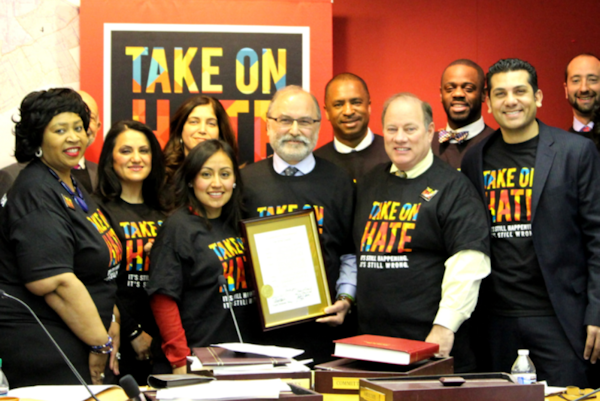PAUL PEREZ
DAC Director Mission & Justice Engagement
In the wake of the tragic events of Paris and San Bernardino there are reports of a spike in anti-Muslim violence and a public proposal to restrict immigration of Muslims into the U.S. based on religion. A term being used to describe the growing anti-Muslim rhetoric and violence is Islamophobia.
As a Christian and a citizen of the U.S., I have found myself distressed by these developments that are contrary to my belief that every person is created in the image of God and to my conviction that religious liberty and diverse communities are crucial values for U.S. society. This distress leads me to ask:
What is Islamophobia? And how can United Methodists respond in support of the Muslim community?
For insight into these questions, I turned to Rashida Tlaib. Rashida was the first Muslim women elected to the Michigan State House of Representatives. Currently she is the Community Partnerships and Development Director at Sugar Law Center in Detroit and is a leader of Take On Hate, a grassroots campaign that challenges the growing discrimination and persistent misconception of Arab and Muslim Americans, including refugees of Arab and Muslim descent, in the U.S.
So what positive actions can be taken? Here are her responses …
A term being used to describe the Anti-muslim rhetoric and violence is Islamophobia. What is one thing United Methodists need to know about Islamophobia?
It is a form of hate that can lead to real human impact, including violence and assault. Arab Americans, especially those of Muslim faith, are being targeted solely based on their ethnicity and faith.
What are the best ways for a non-Muslim ally to stand in solidarity with the Muslim community and “Take on Hate”?
- Speak up. Silence hurts. When we don’t speak up against this type of hatred, then we are in essence condoning it.
- Be engaged. Take on Hate has an email list to alert when your voice and action is needed. You can also hold a local house party or what the Take on Hate campaign calls “community conversations.” TOH believes in the power of direct human contact that can bring more compassion and awareness to this hate crisis in our country. Visit http://www.takeonhate.org/ to sign up.
- Contact your local media. Please reach out to your local media to write an op-ed or to respond to a story or editorial that did not meet the standards of what our country stands for.
What can United Methodist congregations do to stand in solidarity with the Muslim community and “Take on Hate?”
- Host a community conversation. Take on Hate has a toolkit to help.
- Take a public stance against the hate rhetoric via social media, print and other ways to encourage solidarity.
- Help us humanize Arab Americans and American Muslims. So many hear about the hate crimes but don’t really get an opportunity to know them as a fellow human being.
Rashida’s suggestions align with United Methodist social teaching.
United Methodists, in “Our Muslim Neighbors,” affirm that “Christians and Muslims acknowledge common roots, along with Jews, in the faith of Abraham, Sarah, and Hagar. As members of one of the monotheistic world religions, Muslims worship and serve the one God with disciplined devotion.”
The statement “Prejudice Against Muslims and Arabs in the U.S.” calls on United Methodists to “oppose demagoguery, manipulation, and image-making that seeks to label Arabs and Muslims in a negative way” and to “counter stereotypical and bigoted statements made against Muslims and Islam, Arabs and Arabic culture.”
It is clear, to me, that United Methodist should stand in solidarity with our Muslim neighbors. I believe that this stance is what will truly make our communities and our world safe.
If I can be of any assistance as you and your congregations put our social teaching into action, please do not hesitate to contact me at pperez@detroitconference.org.
Last Updated on January 9, 2023

